n
1 one of the units of speech or writing that native speakers of a language usually regard as the smallest isolable meaningful element of the language, although linguists would analyse these further into morphemes
Related adj →
lexical →
verbal
2 an instance of vocal intercourse; chat, talk, or discussion
to have a word with someone
3 an utterance or expression, esp. a brief one
a word of greeting
4 news or information
he sent word that he would be late
5 a verbal signal for action; command
when I give the word, fire!
6 an undertaking or promise
I give you my word, he kept his word
7 an autocratic decree or utterance; order
his word must be obeyed
8 a watchword or slogan, as of a political party
the word now is «freedom»
9 (Computing) a set of bits used to store, transmit, or operate upon an item of information in a computer, such as a program instruction
10 ♦
as good as one’s word doing what one has undertaken or promised to do
12 ♦
by word of mouth orally rather than by written means
13 ♦
in a word briefly or in short
a an exclamation of surprise, annoyance, etc.
b (Austral) an exclamation of agreement
15 ♦
of one’s word given to or noted for keeping one’s promises
I am a man of my word
16 ♦
put in a word or good word for to make favourable mention of (someone); recommend
17 ♦
take someone at his or her word to assume that someone means, or will do, what he or she says
when he told her to go, she took him at his word and left
18 ♦
take someone’s word for it to accept or believe what someone says
a the closing remark of a conversation or argument, esp. a remark that supposedly settles an issue
b the latest or most fashionable design, make, or model
the last word in bikinis
c the finest example (of some quality, condition, etc.)
the last word in luxury
20 ♦
the word the proper or most fitting expression
cold is not the word for it, it’s freezing!
b an exclamation of surprise, annoyance, etc.
a (of a report, transcription, etc.) using exactly the same words as those employed in the situation being reported; verbatim
b translated by substituting each word in the new text for each corresponding word in the original rather than by general sense
23 ♦
word of honour a promise; oath
24 modifier of, relating to, or consisting of words
a word list
vb
25 tr to state in words, usually specially selected ones; phrase
26 tr; often foll by: up (Austral)
informal to inform or advise (a person), (See also)
→
words
(Old English word; related to Old High German wort, Old Norse orth, Gothic waurd, Latin verbum, Sanskrit vratá command)
boo-word
n any word that seems to cause irrational fear
«communism» became a boo-word in the McCarthy era
buzz word
n
Informal a word, often originating in a particular jargon, that becomes a vogue word in the community as a whole or among a particular group
content word
n a word to which an independent meaning can be given by reference to a world outside any sentence in which the word may occur
Compare →
function word →
lexical meaning
four-letter word
n any of several short English words referring to sex or excrement: often used as swearwords and regarded generally as offensive or obscene
function word
n (Grammar) a word, such as the, with a particular grammatical role but little identifiable meaning
Compare →
content word →
grammatical meaning
f-word
n
♦
the. sometimes cap a euphemistic way of referring to the word →
fuck
(from f(uck) + word)
ghost word
n a word that has entered the language through the perpetuation, in dictionaries, etc., of an error
loan word
n a word adopted, often with some modification of its form, from one language into another
nonce word
n a word coined for a single occasion
portmanteau word
n another name for →
blend →
7
(C19: from the idea that two meanings are packed into one word)
reserved word
n a word in a programming language or computer system that has a fixed meaning and therefore cannot be redefined by a programmer
Word
n
♦
the
1 (Christianity) the 2nd person of the Trinity
2 Scripture, the Bible, or the Gospels as embodying or representing divine revelation, (Often called)
the Word of God
(translation of Greek logos, as in John 1:1)
-word
n combining form preceded by the and an initial letter a euphemistic way of referring to a word by its first letter because it is considered to be in some way unmentionable by the user
the C-word, meaning cancer
word association
n an early method of psychoanalysis in which the patient thinks of the first word that comes into consciousness on hearing a given word. In this way it was claimed that aspects of the unconscious could be revealed before defence mechanisms intervene
word blindness
n the nontechnical name for alexia and dyslexia
♦
word-blind adj
word class
n (Linguistics) a form class in which the members are words
See →
part of speech
word deafness
n loss of ability to understand spoken words, esp. as the result of a cerebral lesion, (Also called)
auditory aphasia
♦
word-deaf adj
word game
n any game involving the formation, discovery, or alteration of a word or words
word order
n the arrangement of words in a phrase, clause, or sentence. In many languages, including English, word order plays an important part in determining meanings expressed in other languages by inflections
word-perfect , (U.S.) letter-perfect
adj
1 correct in every detail
2 (of a speech, part in a play, etc.) memorized perfectly
3 (of a speaker, actor, etc.) knowing one’s speech, role, etc., perfectly
word picture
n a verbal description, esp. a vivid one
word processing
n the composition of documents using a computer system to input, edit, store, and print them
word processor
n
a a computer program that performs word processing
b a computer system designed for word processing
word square
n a puzzle in which the player must fill a square grid with words that read the same across as down
word stress
n the stress accent on the syllables of individual words either in a sentence or in isolation
word wrapping
n (Computing) the automatic shifting of a word at the end of a line to a new line in order to keep within preset margins
English Collins Dictionary — English Definition & Thesaurus
Word
n
♦
the
1 (Christianity) the 2nd person of the Trinity
2 Scripture, the Bible, or the Gospels as embodying or representing divine revelation, (Often called)
the Word of God
(translation of Greek logos, as in John 1:1)
boo-word
n any word that seems to cause irrational fear
«communism» became a boo-word in the McCarthy era
buzz word
n
Informal a word, often originating in a particular jargon, that becomes a vogue word in the community as a whole or among a particular group
content word
n a word to which an independent meaning can be given by reference to a world outside any sentence in which the word may occur
Compare →
function word →
lexical meaning
four-letter word
n any of several short English words referring to sex or excrement: often used as swearwords and regarded generally as offensive or obscene
function word
n (Grammar) a word, such as the, with a particular grammatical role but little identifiable meaning
Compare →
content word →
grammatical meaning
f-word
n
♦
the. sometimes cap a euphemistic way of referring to the word →
fuck
(from f(uck) + word)
ghost word
n a word that has entered the language through the perpetuation, in dictionaries, etc., of an error
loan word
n a word adopted, often with some modification of its form, from one language into another
nonce word
n a word coined for a single occasion
portmanteau word
n another name for →
blend →
7
(C19: from the idea that two meanings are packed into one word)
reserved word
n a word in a programming language or computer system that has a fixed meaning and therefore cannot be redefined by a programmer
word
n
1 one of the units of speech or writing that native speakers of a language usually regard as the smallest isolable meaningful element of the language, although linguists would analyse these further into morphemes
Related adj →
lexical →
verbal
2 an instance of vocal intercourse; chat, talk, or discussion
to have a word with someone
3 an utterance or expression, esp. a brief one
a word of greeting
4 news or information
he sent word that he would be late
5 a verbal signal for action; command
when I give the word, fire!
6 an undertaking or promise
I give you my word, he kept his word
7 an autocratic decree or utterance; order
his word must be obeyed
8 a watchword or slogan, as of a political party
the word now is «freedom»
9 (Computing) a set of bits used to store, transmit, or operate upon an item of information in a computer, such as a program instruction
10 ♦
as good as one’s word doing what one has undertaken or promised to do
12 ♦
by word of mouth orally rather than by written means
13 ♦
in a word briefly or in short
a an exclamation of surprise, annoyance, etc.
b (Austral) an exclamation of agreement
15 ♦
of one’s word given to or noted for keeping one’s promises
I am a man of my word
16 ♦
put in a word or good word for to make favourable mention of (someone); recommend
17 ♦
take someone at his or her word to assume that someone means, or will do, what he or she says
when he told her to go, she took him at his word and left
18 ♦
take someone’s word for it to accept or believe what someone says
a the closing remark of a conversation or argument, esp. a remark that supposedly settles an issue
b the latest or most fashionable design, make, or model
the last word in bikinis
c the finest example (of some quality, condition, etc.)
the last word in luxury
20 ♦
the word the proper or most fitting expression
cold is not the word for it, it’s freezing!
b an exclamation of surprise, annoyance, etc.
a (of a report, transcription, etc.) using exactly the same words as those employed in the situation being reported; verbatim
b translated by substituting each word in the new text for each corresponding word in the original rather than by general sense
23 ♦
word of honour a promise; oath
24 modifier of, relating to, or consisting of words
a word list
vb
25 tr to state in words, usually specially selected ones; phrase
26 tr; often foll by: up (Austral)
informal to inform or advise (a person), (See also)
→
words
(Old English word; related to Old High German wort, Old Norse orth, Gothic waurd, Latin verbum, Sanskrit vratá command)
-word
n combining form preceded by the and an initial letter a euphemistic way of referring to a word by its first letter because it is considered to be in some way unmentionable by the user
the C-word, meaning cancer
word association
n an early method of psychoanalysis in which the patient thinks of the first word that comes into consciousness on hearing a given word. In this way it was claimed that aspects of the unconscious could be revealed before defence mechanisms intervene
word blindness
n the nontechnical name for alexia and dyslexia
♦
word-blind adj
word class
n (Linguistics) a form class in which the members are words
See →
part of speech
word deafness
n loss of ability to understand spoken words, esp. as the result of a cerebral lesion, (Also called)
auditory aphasia
♦
word-deaf adj
word game
n any game involving the formation, discovery, or alteration of a word or words
word order
n the arrangement of words in a phrase, clause, or sentence. In many languages, including English, word order plays an important part in determining meanings expressed in other languages by inflections
word-perfect , (U.S.) letter-perfect
adj
1 correct in every detail
2 (of a speech, part in a play, etc.) memorized perfectly
3 (of a speaker, actor, etc.) knowing one’s speech, role, etc., perfectly
word picture
n a verbal description, esp. a vivid one
word processing
n the composition of documents using a computer system to input, edit, store, and print them
word processor
n
a a computer program that performs word processing
b a computer system designed for word processing
word square
n a puzzle in which the player must fill a square grid with words that read the same across as down
word stress
n the stress accent on the syllables of individual words either in a sentence or in isolation
word wrapping
n (Computing) the automatic shifting of a word at the end of a line to a new line in order to keep within preset margins
English Collins Dictionary — English Definition & Thesaurus
household name , word
n a person or thing that is very well known
boo-word
n any word that seems to cause irrational fear
«communism» became a boo-word in the McCarthy era
buzz word
n
Informal a word, often originating in a particular jargon, that becomes a vogue word in the community as a whole or among a particular group
content word
n a word to which an independent meaning can be given by reference to a world outside any sentence in which the word may occur
Compare →
function word →
lexical meaning
four-letter word
n any of several short English words referring to sex or excrement: often used as swearwords and regarded generally as offensive or obscene
function word
n (Grammar) a word, such as the, with a particular grammatical role but little identifiable meaning
Compare →
content word →
grammatical meaning
f-word
n
♦
the. sometimes cap a euphemistic way of referring to the word →
fuck
(from f(uck) + word)
ghost word
n a word that has entered the language through the perpetuation, in dictionaries, etc., of an error
loan word
n a word adopted, often with some modification of its form, from one language into another
nonce word
n a word coined for a single occasion
portmanteau word
n another name for →
blend →
7
(C19: from the idea that two meanings are packed into one word)
reserved word
n a word in a programming language or computer system that has a fixed meaning and therefore cannot be redefined by a programmer
word
n
1 one of the units of speech or writing that native speakers of a language usually regard as the smallest isolable meaningful element of the language, although linguists would analyse these further into morphemes
Related adj →
lexical →
verbal
2 an instance of vocal intercourse; chat, talk, or discussion
to have a word with someone
3 an utterance or expression, esp. a brief one
a word of greeting
4 news or information
he sent word that he would be late
5 a verbal signal for action; command
when I give the word, fire!
6 an undertaking or promise
I give you my word, he kept his word
7 an autocratic decree or utterance; order
his word must be obeyed
8 a watchword or slogan, as of a political party
the word now is «freedom»
9 (Computing) a set of bits used to store, transmit, or operate upon an item of information in a computer, such as a program instruction
10 ♦
as good as one’s word doing what one has undertaken or promised to do
12 ♦
by word of mouth orally rather than by written means
13 ♦
in a word briefly or in short
a an exclamation of surprise, annoyance, etc.
b (Austral) an exclamation of agreement
15 ♦
of one’s word given to or noted for keeping one’s promises
I am a man of my word
16 ♦
put in a word or good word for to make favourable mention of (someone); recommend
17 ♦
take someone at his or her word to assume that someone means, or will do, what he or she says
when he told her to go, she took him at his word and left
18 ♦
take someone’s word for it to accept or believe what someone says
a the closing remark of a conversation or argument, esp. a remark that supposedly settles an issue
b the latest or most fashionable design, make, or model
the last word in bikinis
c the finest example (of some quality, condition, etc.)
the last word in luxury
20 ♦
the word the proper or most fitting expression
cold is not the word for it, it’s freezing!
b an exclamation of surprise, annoyance, etc.
a (of a report, transcription, etc.) using exactly the same words as those employed in the situation being reported; verbatim
b translated by substituting each word in the new text for each corresponding word in the original rather than by general sense
23 ♦
word of honour a promise; oath
24 modifier of, relating to, or consisting of words
a word list
vb
25 tr to state in words, usually specially selected ones; phrase
26 tr; often foll by: up (Austral)
informal to inform or advise (a person), (See also)
→
words
(Old English word; related to Old High German wort, Old Norse orth, Gothic waurd, Latin verbum, Sanskrit vratá command)
Word
n
♦
the
1 (Christianity) the 2nd person of the Trinity
2 Scripture, the Bible, or the Gospels as embodying or representing divine revelation, (Often called)
the Word of God
(translation of Greek logos, as in John 1:1)
-word
n combining form preceded by the and an initial letter a euphemistic way of referring to a word by its first letter because it is considered to be in some way unmentionable by the user
the C-word, meaning cancer
word association
n an early method of psychoanalysis in which the patient thinks of the first word that comes into consciousness on hearing a given word. In this way it was claimed that aspects of the unconscious could be revealed before defence mechanisms intervene
word blindness
n the nontechnical name for alexia and dyslexia
♦
word-blind adj
word class
n (Linguistics) a form class in which the members are words
See →
part of speech
word deafness
n loss of ability to understand spoken words, esp. as the result of a cerebral lesion, (Also called)
auditory aphasia
♦
word-deaf adj
word game
n any game involving the formation, discovery, or alteration of a word or words
word order
n the arrangement of words in a phrase, clause, or sentence. In many languages, including English, word order plays an important part in determining meanings expressed in other languages by inflections
word-perfect , (U.S.) letter-perfect
adj
1 correct in every detail
2 (of a speech, part in a play, etc.) memorized perfectly
3 (of a speaker, actor, etc.) knowing one’s speech, role, etc., perfectly
word picture
n a verbal description, esp. a vivid one
word processing
n the composition of documents using a computer system to input, edit, store, and print them
word processor
n
a a computer program that performs word processing
b a computer system designed for word processing
word square
n a puzzle in which the player must fill a square grid with words that read the same across as down
word stress
n the stress accent on the syllables of individual words either in a sentence or in isolation
word wrapping
n (Computing) the automatic shifting of a word at the end of a line to a new line in order to keep within preset margins
English Collins Dictionary — English Definition & Thesaurus
Inner Light , Word
n (Quakerism) the presence and inner working of God in the soul acting as a guiding spirit that is superior even to Scripture and unites man to Christ
boo-word
n any word that seems to cause irrational fear
«communism» became a boo-word in the McCarthy era
buzz word
n
Informal a word, often originating in a particular jargon, that becomes a vogue word in the community as a whole or among a particular group
content word
n a word to which an independent meaning can be given by reference to a world outside any sentence in which the word may occur
Compare →
function word →
lexical meaning
four-letter word
n any of several short English words referring to sex or excrement: often used as swearwords and regarded generally as offensive or obscene
function word
n (Grammar) a word, such as the, with a particular grammatical role but little identifiable meaning
Compare →
content word →
grammatical meaning
f-word
n
♦
the. sometimes cap a euphemistic way of referring to the word →
fuck
(from f(uck) + word)
ghost word
n a word that has entered the language through the perpetuation, in dictionaries, etc., of an error
loan word
n a word adopted, often with some modification of its form, from one language into another
nonce word
n a word coined for a single occasion
portmanteau word
n another name for →
blend →
7
(C19: from the idea that two meanings are packed into one word)
reserved word
n a word in a programming language or computer system that has a fixed meaning and therefore cannot be redefined by a programmer
word
n
1 one of the units of speech or writing that native speakers of a language usually regard as the smallest isolable meaningful element of the language, although linguists would analyse these further into morphemes
Related adj →
lexical →
verbal
2 an instance of vocal intercourse; chat, talk, or discussion
to have a word with someone
3 an utterance or expression, esp. a brief one
a word of greeting
4 news or information
he sent word that he would be late
5 a verbal signal for action; command
when I give the word, fire!
6 an undertaking or promise
I give you my word, he kept his word
7 an autocratic decree or utterance; order
his word must be obeyed
8 a watchword or slogan, as of a political party
the word now is «freedom»
9 (Computing) a set of bits used to store, transmit, or operate upon an item of information in a computer, such as a program instruction
10 ♦
as good as one’s word doing what one has undertaken or promised to do
12 ♦
by word of mouth orally rather than by written means
13 ♦
in a word briefly or in short
a an exclamation of surprise, annoyance, etc.
b (Austral) an exclamation of agreement
15 ♦
of one’s word given to or noted for keeping one’s promises
I am a man of my word
16 ♦
put in a word or good word for to make favourable mention of (someone); recommend
17 ♦
take someone at his or her word to assume that someone means, or will do, what he or she says
when he told her to go, she took him at his word and left
18 ♦
take someone’s word for it to accept or believe what someone says
a the closing remark of a conversation or argument, esp. a remark that supposedly settles an issue
b the latest or most fashionable design, make, or model
the last word in bikinis
c the finest example (of some quality, condition, etc.)
the last word in luxury
20 ♦
the word the proper or most fitting expression
cold is not the word for it, it’s freezing!
b an exclamation of surprise, annoyance, etc.
a (of a report, transcription, etc.) using exactly the same words as those employed in the situation being reported; verbatim
b translated by substituting each word in the new text for each corresponding word in the original rather than by general sense
23 ♦
word of honour a promise; oath
24 modifier of, relating to, or consisting of words
a word list
vb
25 tr to state in words, usually specially selected ones; phrase
26 tr; often foll by: up (Austral)
informal to inform or advise (a person), (See also)
→
words
(Old English word; related to Old High German wort, Old Norse orth, Gothic waurd, Latin verbum, Sanskrit vratá command)
Word
n
♦
the
1 (Christianity) the 2nd person of the Trinity
2 Scripture, the Bible, or the Gospels as embodying or representing divine revelation, (Often called)
the Word of God
(translation of Greek logos, as in John 1:1)
-word
n combining form preceded by the and an initial letter a euphemistic way of referring to a word by its first letter because it is considered to be in some way unmentionable by the user
the C-word, meaning cancer
word association
n an early method of psychoanalysis in which the patient thinks of the first word that comes into consciousness on hearing a given word. In this way it was claimed that aspects of the unconscious could be revealed before defence mechanisms intervene
word blindness
n the nontechnical name for alexia and dyslexia
♦
word-blind adj
word class
n (Linguistics) a form class in which the members are words
See →
part of speech
word deafness
n loss of ability to understand spoken words, esp. as the result of a cerebral lesion, (Also called)
auditory aphasia
♦
word-deaf adj
word game
n any game involving the formation, discovery, or alteration of a word or words
word order
n the arrangement of words in a phrase, clause, or sentence. In many languages, including English, word order plays an important part in determining meanings expressed in other languages by inflections
word-perfect , (U.S.) letter-perfect
adj
1 correct in every detail
2 (of a speech, part in a play, etc.) memorized perfectly
3 (of a speaker, actor, etc.) knowing one’s speech, role, etc., perfectly
word picture
n a verbal description, esp. a vivid one
word processing
n the composition of documents using a computer system to input, edit, store, and print them
word processor
n
a a computer program that performs word processing
b a computer system designed for word processing
word square
n a puzzle in which the player must fill a square grid with words that read the same across as down
word stress
n the stress accent on the syllables of individual words either in a sentence or in isolation
word wrapping
n (Computing) the automatic shifting of a word at the end of a line to a new line in order to keep within preset margins
English Collins Dictionary — English Definition & Thesaurus
word
n
1 brief conversation, chat, chitchat, colloquy, confab (informal) confabulation, consultation, discussion, talk, tête-à-tête
2 brief statement, comment, declaration, expression, remark, utterance
3 expression, locution, name, term, vocable
4 account, advice, bulletin, communication, communiqué, dispatch, gen (Brit. informal) information, intelligence, intimation, latest (informal) message, news, notice, report, tidings
5 command, go-ahead (informal) green light, order, signal
6 affirmation, assertion, assurance, guarantee, oath, parole, pledge, promise, solemn oath, solemn word, undertaking, vow, word of honour
7 bidding, command, commandment, decree, edict, mandate, order, ukase (rare) will
8 countersign, password, slogan, watchword
9 in a word briefly, concisely, in a nutshell, in short, succinctly, to put it briefly, to sum up
vb
10 couch, express, phrase, put, say, state, utter
last word, the
1 final say, finis, mother (of all), summation, ultimatum
2 best, cream, crème de la crème, crown, epitome, ne plus ultra, perfection, quintessence, ultimate
3 dernier cri, fashion, latest, newest, rage, vogue
English Collins Dictionary — English synonyms & Thesaurus
portmanteau word
n.

a new word formed by joining together two others and combining their meanings.
Examples: brunch, camcorder, carjack, motel, greenwash, smog, workaholic.
Additional comments:
Collaborative Dictionary English Definition
|
sound out (a word) |
v. |
to say, pronounce, speak |
ex.: The child sounded out each word out loud as she read her book. |
|
|
the f-word |
n. |
euphemism referring to the word «fuck» |
||
|
the n-word |
n. |
euphemism referring to the taboo word «nigger» |
||
|
the c-word |
n. |
euphemism used to refer to the taboo word «cunt» |
||
|
smackeroo |
n. |
colloquial word for a dollar |
||
|
charver |
n. |
charver is another word for chav |
If you lived in Newcastle you would know it. Common in NE England |
|
|
! Momasita |
n. |
An endearing word for mom. |
||
|
! kerned yoghourt
|
v. |
kerned is a Somerset word meaning ‘thickened’ |
||
|
ship |
n. |
An abbreviation of the word ‘relationship.’ The word describes fans’ approval of fictional or desired romances between characters or pop culture figures. |
Example: I totally ship Selena Gomez and Justin Bieber. |
|
|
pneumonoultramicroscopicsilicovolcanoconiosis |
n. |
artificial long word coined to mean a lung disease known as silicosis, a type of pneumoconiosis caused by inhalation of ultra-microscopic particles of crystalline silica volcanic dust. It has the particularity of being the longest word in the English language published in a dictionary |
Longer tech. terms exist (up to 189,819 letters!).The word, presumably coined in 1935 by E.M. Smith (pres. of the National Puzzlers’League) in imitation of very long medical terms, contains 45 letters |
|
|
bung |
n. |
a colloquial word meaning a bribe: policemen accepting bungs from journalists |
||
|
F-bomb |
n. |
Used as an euphemism for replacing the word ‘fuck’, with reference to the latter’s taboo status and potential to shock or offend |
[informal] Ex: Known for her banters and taste for swearing, the down-to-earth and much loved popstar was nonetheless warned to avoid dropping the F-bomb during the broadcast live ceremony |
|
|
grawlix |
n. |
string of symbols used instead of an obscene word (ex.: #!@*) |
||
|
Lesewut |
n. |
Lesewut is a German word for «reading craze» (literally) used to describe a specific period in the intellectual history of Germany from the late eighteenth century onward. |
||
|
gazunder |
n. |
a humorous and old-fashioned word that means a chamber pot |
Comes from the fact that the chamber pot ‘gazunder’ (= goes under) the bed |
|
|
craption |
n. |
word created with «crap» and «caption» to mean a bad quality caption |
[Fam.];[Fig.] |
|
|
employerism |
n. |
a portmanteau of ’employer’ and ‘voyeurism’. signifies the act of searching for an employer or the practice of an employer when looking to fill positions. The term places an emphasis on the secretive connotation of the word ‘voyeur’, denoting a clandestine and thus superior form of employment search |
[Tech.] Ex.: Employerism is what one must engage in, if one wishes to embark upon a more productive job hunt! |
|
|
! automagically |
adv. |
Supernaturally performed from force of habit or without conscious thought; a portmanteau word formed from «automatically» and «magically» |
Wherever he went, flowers automagically materialized in the hands of all nearby women. |
To add entries to your own vocabulary, become a member of Reverso community or login if you are already a member.
It’s easy and only takes a few seconds:
Скачать материал

Скачать материал




- Сейчас обучается 396 человек из 63 регионов




Описание презентации по отдельным слайдам:
-
1 слайд
Word Meaning
Lecture # 6
Grigoryeva M. -
2 слайд
Word Meaning
Approaches to word meaning
Meaning and Notion (понятие)
Types of word meaning
Types of morpheme meaning
Motivation
-
3 слайд
Each word has two aspects:
the outer aspect
( its sound form)
catthe inner aspect
(its meaning)
long-legged, fury animal with sharp teeth
and claws -
4 слайд
Sound and meaning do not always constitute a constant unit even in the same language
EX a temple
a part of a human head
a large church -
5 слайд
Semantics (Semasiology)
Is a branch of lexicology which studies the
meaning of words and word equivalents -
6 слайд
Approaches to Word Meaning
The Referential (analytical) approachThe Functional (contextual) approach
Operational (information-oriented) approach
-
7 слайд
The Referential (analytical) approach
formulates the essence of meaning by establishing the interdependence between words and things or concepts they denotedistinguishes between three components closely connected with meaning:
the sound-form of the linguistic sign,
the concept
the actual referent -
8 слайд
Basic Triangle
concept (thought, reference) – the thought of the object that singles out its essential features
referent – object denoted by the word, part of reality
sound-form (symbol, sign) – linguistic sign
concept – flowersound-form referent
[rәuz] -
9 слайд
In what way does meaning correlate with
each element of the triangle ?In what relation does meaning stand to
each of them? -
10 слайд
Meaning and Sound-form
are not identical
different
EX. dove — [dΛv] English sound-forms
[golub’] Russian BUT
[taube] German
the same meaning -
11 слайд
Meaning and Sound-form
nearly identical sound-forms have different meanings in different languages
EX. [kot] Russian – a male cat
[kot] English – a small bed for a childidentical sound-forms have different meanings (‘homonyms)
EX. knight [nait]
night [nait] -
12 слайд
Meaning and Sound-form
even considerable changes in sound-form do not affect the meaningEX Old English lufian [luvian] – love [l Λ v]
-
13 слайд
Meaning and Concept
concept is a category of human cognitionconcept is abstract and reflects the most common and typical features of different objects and phenomena in the world
meanings of words are different in different languages
-
14 слайд
Meaning and Concept
identical concepts may have different semantic structures in different languagesEX. concept “a building for human habitation” –
English Russian
HOUSE ДОМ+ in Russian ДОМ
“fixed residence of family or household”
In English HOME -
15 слайд
Meaning and Referent
one and the same object (referent) may be denoted by more than one word of a different meaning
cat
pussy
animal
tiger -
16 слайд
Meaning
is not identical with any of the three points of the triangle –
the sound form,
the concept
the referentBUT
is closely connected with them. -
17 слайд
Functional Approach
studies the functions of a word in speech
meaning of a word is studied through relations of it with other linguistic units
EX. to move (we move, move a chair)
movement (movement of smth, slow movement)The distriution ( the position of the word in relation to
others) of the verb to move and a noun movement is
different as they belong to different classes of words and
their meanings are different -
18 слайд
Operational approach
is centered on defining meaning through its role in
the process of communicationEX John came at 6
Beside the direct meaning the sentence may imply that:
He was late
He failed to keep his promise
He was punctual as usual
He came but he didn’t want toThe implication depends on the concrete situation
-
19 слайд
Lexical Meaning and Notion
Notion denotes the reflection in the mind of real objectsNotion is a unit of thinking
Lexical meaning is the realization of a notion by means of a definite language system
Word is a language unit -
20 слайд
Lexical Meaning and Notion
Notions are international especially with the nations of the same cultural levelMeanings are nationally limited
EX GO (E) —- ИДТИ(R)
“To move”
BUT !!!
To GO by bus (E)
ЕХАТЬ (R)EX Man -мужчина, человек
Она – хороший человек (R)
She is a good person (E) -
21 слайд
Types of Meaning
Types of meaninggrammatical
meaninglexico-grammatical
meaning
lexical meaning
denotational
connotational -
22 слайд
Grammatical Meaning
component of meaning recurrent in identical sets of individual forms of different wordsEX. girls, winters, toys, tables –
grammatical meaning of pluralityasked, thought, walked –
meaning of past tense -
23 слайд
Lexico-grammatical meaning
(part –of- speech meaning)
is revealed in the classification of lexical items into:
major word classes (N, V, Adj, Adv)
minor ones (artc, prep, conj)words of one lexico-grammatical class have the same paradigm
-
24 слайд
Lexical Meaning
is the meaning proper to the given linguistic unit in all its forms and distributionsEX . Go – goes — went
lexical meaning – process of movement -
25 слайд
PRACTICE
Group the words into 3 column according to the grammatical, lexical or part-of –speech meaning
Boy’s, nearest, at, beautiful,
think, man, drift, wrote,
tremendous, ship’s, the most beautiful,
table, near, for, went, friend’s,
handsome, thinking, boy,
nearer, thought, boys,
lamp, go, during. -
26 слайд
Grammatical
The case of nouns: boy’s, ship’s, friend’s
The degree of comparison of adj: nearest, the most beautiful
The tense of verbs: wrote, went, thoughtLexical
Think, thinking, thought
Went, go
Boy’s, boy, boys
Nearest, near, nearer
At, for, during (“time”)
Beautiful, the most beautifulPart-of-speech
Nouns—verbs—adj—-prep -
27 слайд
Aspects of Lexical meaning
The denotational aspectThe connotational aspect
The pragmatic aspect
-
28 слайд
Denotational Meaning
“denote” – to be a sign of, stand as a symbol for”establishes the correlation between the name and the object
makes communication possibleEX booklet
“a small thin book that gives info about smth” -
29 слайд
PRACTICE
Explain denotational meaningA lion-hunter
To have a heart like a lion
To feel like a lion
To roar like a lion
To be thrown to the lions
The lion’s share
To put your head in lion’s mouth -
30 слайд
PRACTICE
A lion-hunter
A host that seeks out celebrities to impress guests
To have a heart like a lion
To have great courage
To feel like a lion
To be in the best of health
To roar like a lion
To shout very loudly
To be thrown to the lions
To be criticized strongly or treated badly
The lion’s share
Much more than one’s share
To put your head in lion’s mouth -
31 слайд
Connotational Meaning
reflects the attitude of the speaker towards what he speaks about
it is optional – a word either has it or notConnotation gives additional information and includes:
The emotive charge EX Daddy (for father)
Intensity EX to adore (for to love)
Imagery EX to wade through a book
“ to walk with an effort” -
32 слайд
PRACTICE
Give possible interpretation of the sentencesShe failed to buy it and felt a strange pang.
Don’t be afraid of that woman! It’s just barking!
He got up from his chair moving slowly, like an old man.
The girl went to her father and pulled his sleeve.
He was longing to begin to be generous.
She was a woman with shiny red hands and work-swollen finger knuckles. -
33 слайд
PRACTICE
Give possible interpretation of the sentences
She failed to buy it and felt a strange pang.
(pain—dissatisfaction that makes her suffer)
Don’t be afraid of that woman! It’s just barking!
(make loud sharp sound—-the behavior that implies that the person is frightened)
He got up from his chair moving slowly, like an old man.
(to go at slow speed—was suffering or was ill)
The girl went to her father and pulled his sleeve.
(to move smth towards oneself— to try to attract smb’s attention)
He was longing to begin to be generous.
(to start doing— hadn’t been generous before)
She was a woman with shiny red hands and work-swollen finger knuckles.
(colour— a labourer involved into physical work ,constant contact with water) -
34 слайд
The pragmatic aspect of lexical meaning
the situation in which the word is uttered,
the social circumstances (formal, informal, etc.),
social relationships between the interlocutors (polite, rough, etc.),
the type and purpose of communication (poetic, official, etc.)EX horse (neutral)
steed (poetic)
nag (slang)
gee-gee (baby language) -
35 слайд
PRACTICE
State what image underline the meaningI heard what she said but it didn’t sink into my mind.
You should be ashamed of yourself, crawling to the director like that.
They seized on the idea.
Bill, chasing some skirt again?
I saw him dive into a small pub.
Why are you trying to pin the blame on me?
He only married her for her dough. -
36 слайд
PRACTICE
State what image underline the meaning
I heard what she said but it didn’t sink into my mind.
(to understand completely)
You should be ashamed of yourself, crawling to the director like that.
(to behave humbly in order to win favour)
They seized on the idea.
(to be eager to take and use)
Bill, chasing some skirt again?
(a girl)
I saw him dive into a small pub.
(to enter suddenly)
Why are you trying to pin the blame on me?
(to blame smb unfairly)
He only married her for her dough.
(money) -
37 слайд
Types of Morpheme Meaning
lexical
differential
functional
distributional -
38 слайд
Lexical Meaning in Morphemes
root-morphemes that are homonymous to words possess lexical meaning
EX. boy – boyhood – boyishaffixes have lexical meaning of a more generalized character
EX. –er “agent, doer of an action” -
39 слайд
Lexical Meaning in Morphemes
has denotational and connotational components
EX. –ly, -like, -ish –
denotational meaning of similiarity
womanly , womanishconnotational component –
-ly (positive evaluation), -ish (deragotary) женственный — женоподобный -
40 слайд
Differential Meaning
a semantic component that serves to distinguish one word from all others containing identical morphemesEX. cranberry, blackberry, gooseberry
-
41 слайд
Functional Meaning
found only in derivational affixes
a semantic component which serves to
refer the word to the certain part of speechEX. just, adj. – justice, n.
-
42 слайд
Distributional Meaning
the meaning of the order and the arrangement of morphemes making up the word
found in words containing more than one morpheme
different arrangement of the same morphemes would make the word meaningless
EX. sing- + -er =singer,
-er + sing- = ? -
43 слайд
Motivation
denotes the relationship between the phonetic or morphemic composition and structural pattern of the word on the one hand, and its meaning on the othercan be phonetical
morphological
semantic -
44 слайд
Phonetical Motivation
when there is a certain similarity between the sounds that make up the word and those produced by animals, objects, etc.EX. sizzle, boom, splash, cuckoo
-
45 слайд
Morphological Motivation
when there is a direct connection between the structure of a word and its meaning
EX. finger-ring – ring-finger,A direct connection between the lexical meaning of the component morphemes
EX think –rethink “thinking again” -
46 слайд
Semantic Motivation
based on co-existence of direct and figurative meanings of the same wordEX a watchdog –
”a dog kept for watching property”a watchdog –
“a watchful human guardian” (semantic motivation) -
-
48 слайд
Analyze the meaning of the words.
Define the type of motivation
a) morphologically motivated
b) semantically motivatedDriver
Leg
Horse
Wall
Hand-made
Careless
piggish -
49 слайд
Analyze the meaning of the words.
Define the type of motivation
a) morphologically motivated
b) semantically motivated
Driver
Someone who drives a vehicle
morphologically motivated
Leg
The part of a piece of furniture such as a table
semantically motivated
Horse
A piece of equipment shaped like a box, used in gymnastics
semantically motivated -
50 слайд
Wall
Emotions or behavior preventing people from feeling close
semantically motivated
Hand-made
Made by hand, not machine
morphologically motivated
Careless
Not taking enough care
morphologically motivated
Piggish
Selfish
semantically motivated -
51 слайд
I heard what she said but it didn’t sink in my mind
“do down to the bottom”
‘to be accepted by mind” semantic motivationWhy are you trying to pin the blame on me?
“fasten smth somewhere using a pin” –
”to blame smb” semantic motivationI was following the man when he dived into a pub.
“jump into deep water” –
”to enter into suddenly” semantic motivationYou should be ashamed of yourself, crawling to the director like that
“to move along on hands and knees close to the ground” –
“to behave very humbly in order to win favor” semantic motivation
Найдите материал к любому уроку, указав свой предмет (категорию), класс, учебник и тему:
6 210 150 материалов в базе
- Выберите категорию:
- Выберите учебник и тему
- Выберите класс:
-
Тип материала:
-
Все материалы
-
Статьи
-
Научные работы
-
Видеоуроки
-
Презентации
-
Конспекты
-
Тесты
-
Рабочие программы
-
Другие методич. материалы
-
Найти материалы
Другие материалы
- 22.10.2020
- 141
- 0
- 21.09.2020
- 530
- 1
- 18.09.2020
- 256
- 0
- 11.09.2020
- 191
- 1
- 21.08.2020
- 197
- 0
- 18.08.2020
- 123
- 0
- 03.07.2020
- 94
- 0
- 06.06.2020
- 73
- 0
Вам будут интересны эти курсы:
-
Курс повышения квалификации «Формирование компетенций межкультурной коммуникации в условиях реализации ФГОС»
-
Курс профессиональной переподготовки «Клиническая психология: теория и методика преподавания в образовательной организации»
-
Курс повышения квалификации «Введение в сетевые технологии»
-
Курс повышения квалификации «История и философия науки в условиях реализации ФГОС ВО»
-
Курс повышения квалификации «Основы построения коммуникаций в организации»
-
Курс повышения квалификации «Организация практики студентов в соответствии с требованиями ФГОС медицинских направлений подготовки»
-
Курс повышения квалификации «Правовое регулирование рекламной и PR-деятельности»
-
Курс повышения квалификации «Организация маркетинга в туризме»
-
Курс повышения квалификации «Источники финансов»
-
Курс профессиональной переподготовки «Техническая диагностика и контроль технического состояния автотранспортных средств»
-
Курс профессиональной переподготовки «Осуществление и координация продаж»
-
Курс профессиональной переподготовки «Технический контроль и техническая подготовка сварочного процесса»
-
Курс профессиональной переподготовки «Управление качеством»
- connotation
- content
- context
- definition
- effect
- essence
- explanation
- hint
- implication
- interpretation
- nuance
- sense
- significance
- spirit
- subject
- substance
- understanding
- value
- acceptation
- allusion
- bearing
- denotation
- drift
- force
- gist
- heart
- import
- intimation
- meat
- nitty-gritty
- pith
- point
- purport
- stuff
- suggestion
- symbolization
- tenor
- thrust
- upshot
- use
- worth
- bottom line
- name of the game
- nature of beast
- nuts and bolts
- subject matter
- idea
- intent
- interest
- purpose
- animus
- design
- end
- goal
- object
- plan
- point
- trend
On this page you’ll find 102 synonyms, antonyms, and words related to meaning, such as: connotation, content, context, definition, effect, and essence.
Roget’s 21st Century Thesaurus, Third Edition Copyright © 2013 by the Philip Lief Group.
TRY USING meaning
See how your sentence looks with different synonyms.
How to use meaning in a sentence
SYNONYM OF THE DAY
OCTOBER 26, 1985
WORDS RELATED TO MEANING
- connotation
- denotation
- intent
- meaning
- message
- purport
- sense
- significance
- value
- word meaning
- application
- connection
- import
- meaning
- pertinence
- reference
- relation
- relevance
- weight
- addresses
- airs
- aspects
- attitudes
- behaviors
- carriages
- comportment
- demeanor
- deportment
- displays
- fronts
- looks
- manners
- miens
- poise
- ports
- poses
- presences
- sets
- stands
- association
- coloring
- essence
- hint
- meaning
- nuance
- overtone
- significance
- suggestion
- undertone
- associations
- colorings
- essences
- hints
- meanings
- nuances
- overtones
- significances
- suggestions
- undertones
- hinting
- implying
- meaning
- referring
- suggesting
Roget’s 21st Century Thesaurus, Third Edition Copyright © 2013 by the Philip Lief Group.
- Размер: 250 Кб
- Количество слайдов: 17
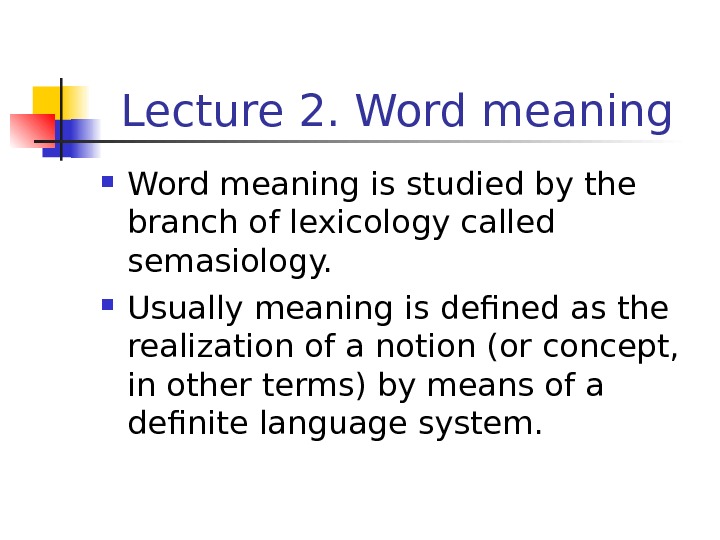
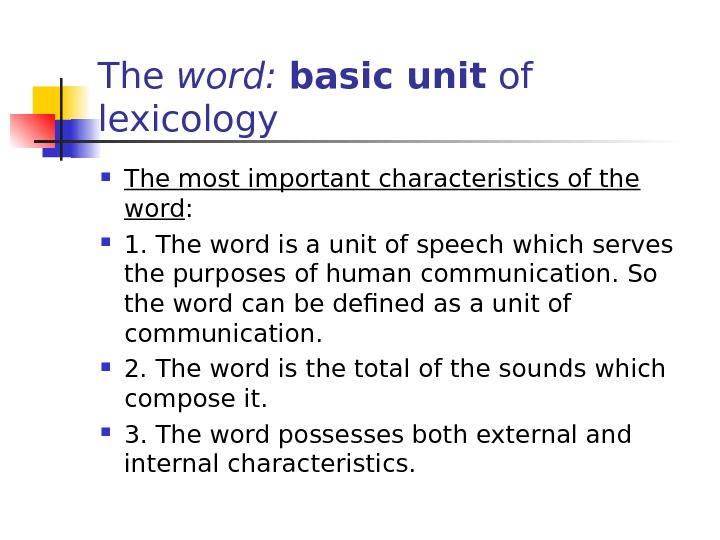
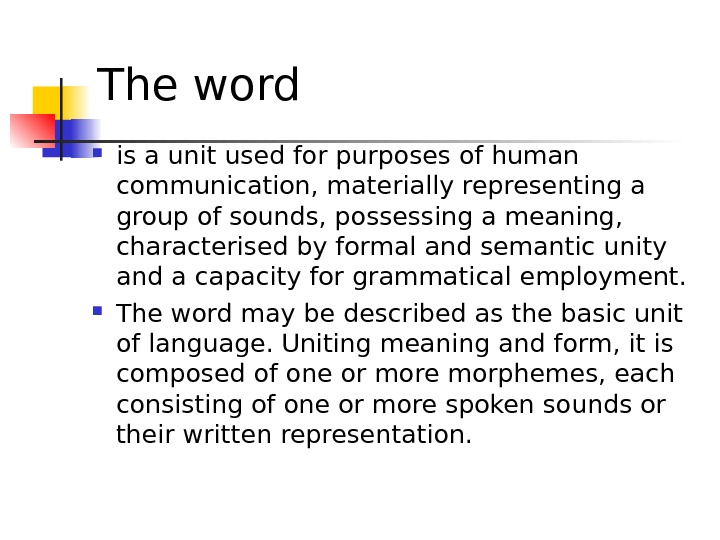
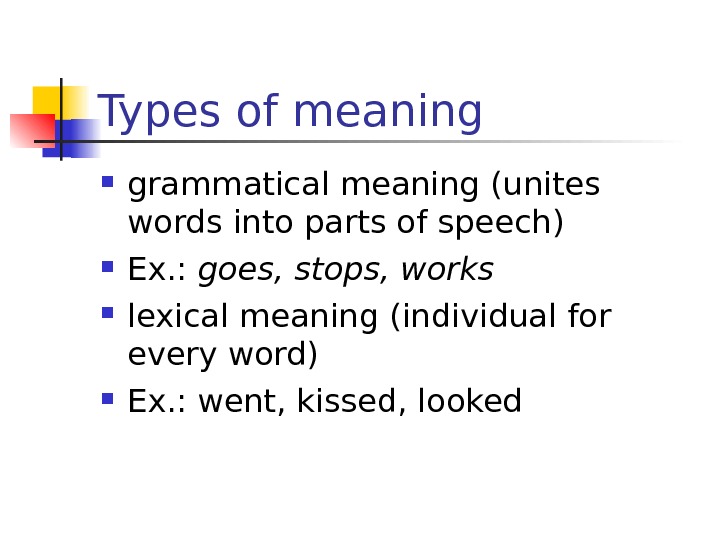
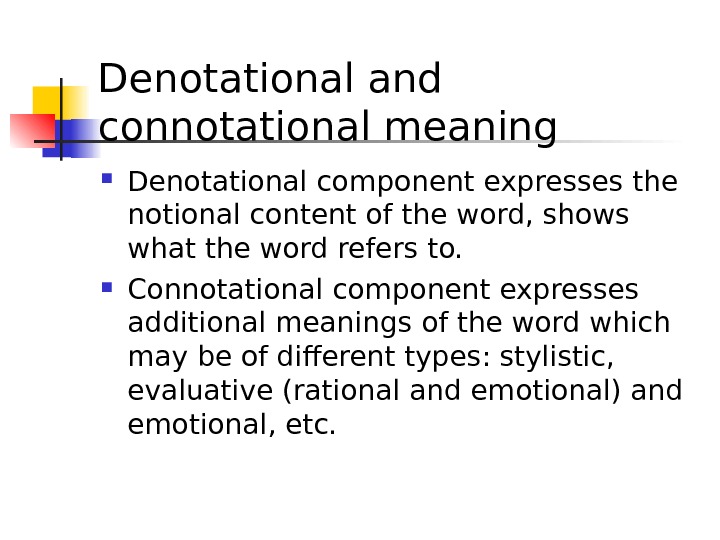


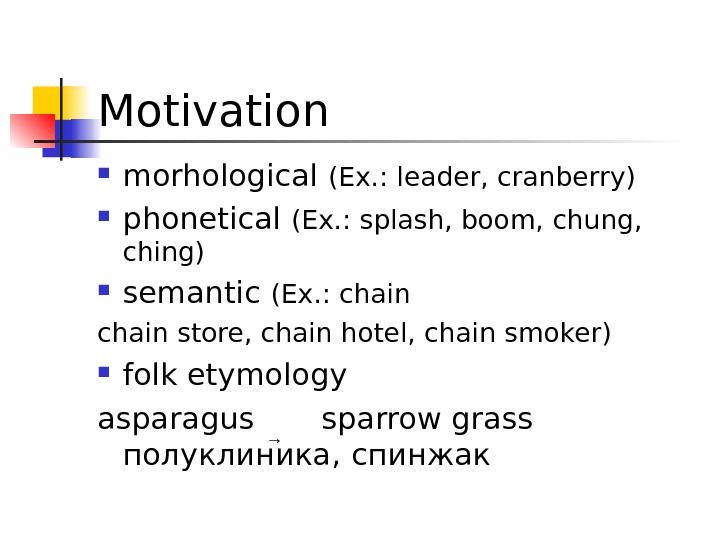

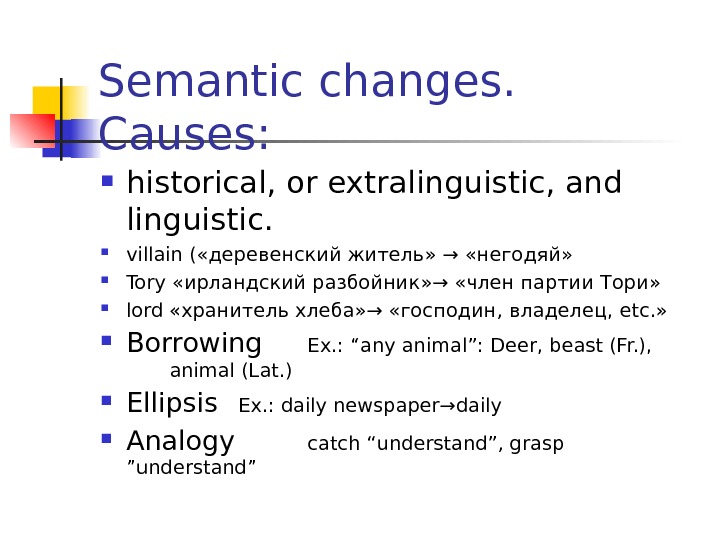
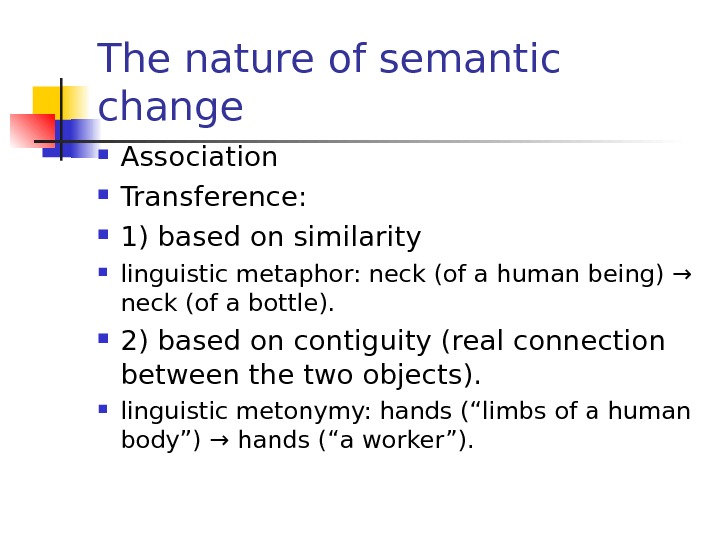
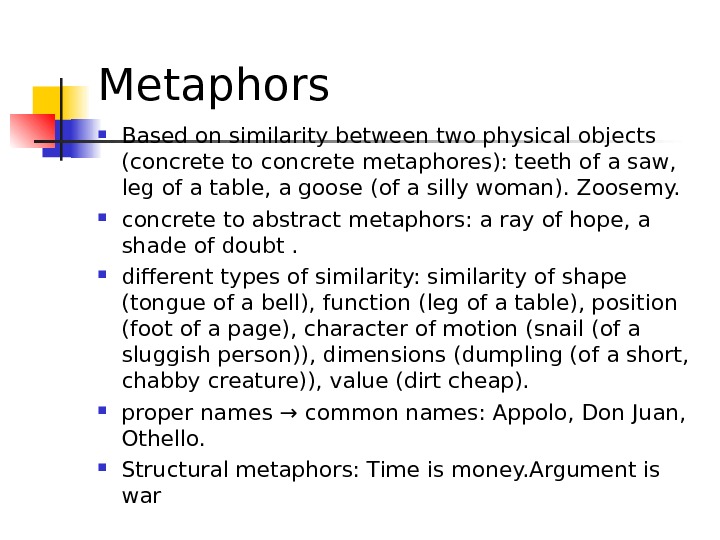



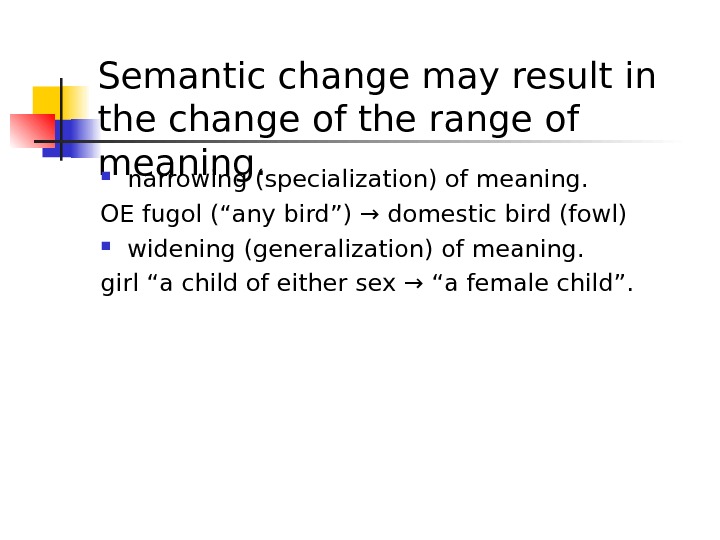
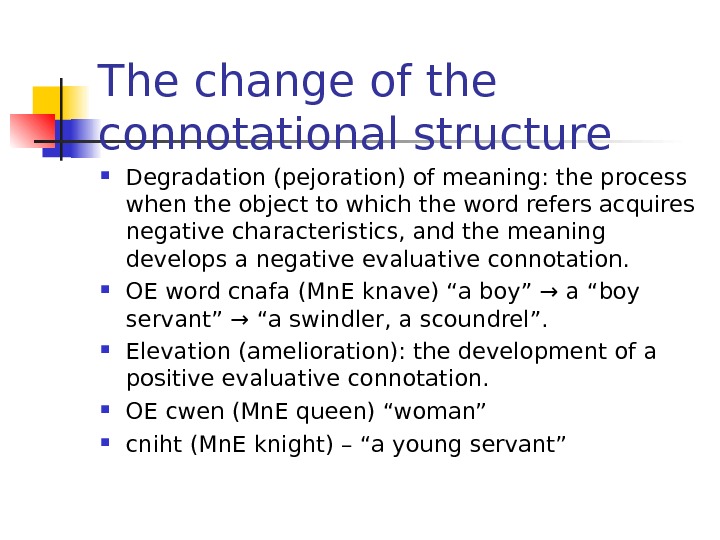














![Meaning and Sound-formare not identical
different
EX. dove - [dΛv]... Meaning and Sound-formare not identical
different
EX. dove - [dΛv]...](https://documents.infourok.ru/2d0c9b9d-1c12-4da2-8c1e-80496902c301/slide_10.jpg)









































